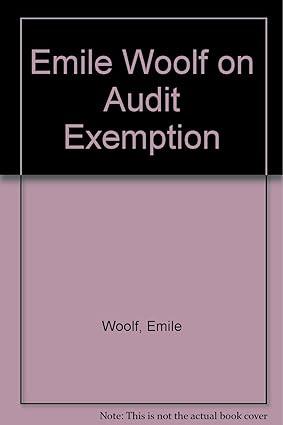Question
Columbo Corporation, a calendar-year corporation, began business in 2014. With the initial capital contributions from its sole shareholder, it purchased a building on March 12
"Columbo Corporation, a calendar-year corporation, began business in 2014. With the initial capital contributions from its sole shareholder, it purchased a building on March 12 for $250,000. It also purchased the following items, all used, for use in the business: ItemPurchase dateAcquisition costOffice furnitureApril 1$8,000ComputerApril 15$4,000Machine AMay 2$15,000Machine BAugust 4$21,000Machine CAugust 12$31,000Columbo did not elect bonus depreciation in 2014 but used MACRS accelerated depreciation on all the assets except Machine B, which it expensed under the Section 179 election.On January 5, 2017, Columbo sold Machine A for $7,000. It purchased an upgraded Machine D for $45,000 on January 20. On May 5, its computer was completely destroyed by a power surge and had to be replaced. The new computer equipment cost $6,000. In October, their building was condemned by the city and Columbo had to move. The city paid Columbo $275,000 for the building and it purchased a new building for $310,000 and moved in on October 30. Also in October, the sole shareholder purchased the office furniture for $100 (fair market value = $2,000) and Columbo purchased new furniture for the new building for $15,000. Rather than move Machine B (fair market value = $6,000), it traded it in on new Machine E paying an additional $28,000 cash for the machine. Determine Columbo Corporations depreciation expense in years 2014 through 2017 if it did not elect bonus depreciation or Section 179 expensing (except for Machine B). Determine the amount and type of realized and recognized gain or loss on each of the property dispositions in 2017. Determine the net effect of the property transactions on Columbos taxable income in 2017. Columbo used straight-line depreciation with a 10-year life for the office furniture and machines and a 5-year life for the computer, taking a full years depreciation in the year of acquisition and none in the year of disposal, for financial accounting purposes. Determine its financial accounting depreciation deductions for years 2014 through 2017.Determine its gains and losses on property transactions for financial accounting in 2017.For 2014 through 2017, determine if the differences between financial accounting and tax accounting depreciation for the property transactions would result in a deferred tax asset or a deferred tax liability for the corporation (consider each year separately)."
Step by Step Solution
There are 3 Steps involved in it
Step: 1

Get Instant Access to Expert-Tailored Solutions
See step-by-step solutions with expert insights and AI powered tools for academic success
Step: 2

Step: 3

Ace Your Homework with AI
Get the answers you need in no time with our AI-driven, step-by-step assistance
Get Started


